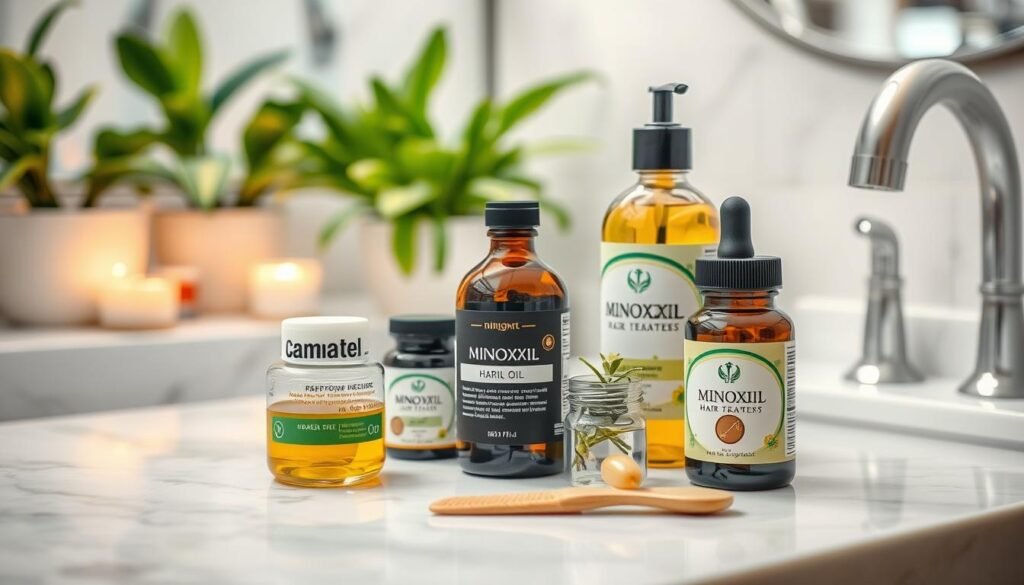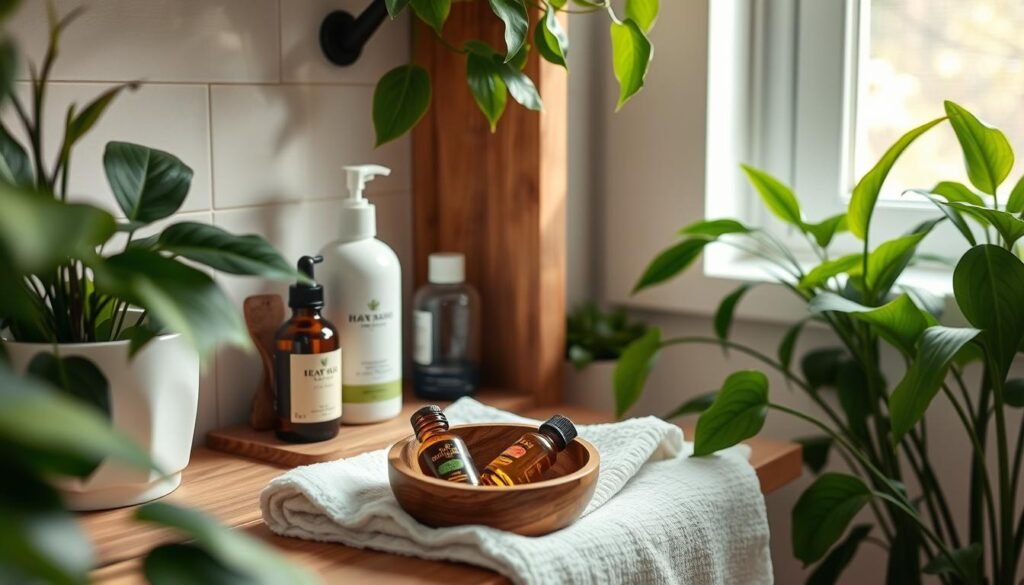Did you know half of men will face hair loss by 50? This fact shows a widespread problem, yet many are unaware of easy fixes. About 25% of women also deal with hair thinning as they get older. Luckily, there are many natural and effective solutions to improve hair health and growth.
This article offers powerful tips to boost your confidence. You will learn about hair loss causes and discover diet changes and treatments for healthier hair. Whether it’s changing daily habits or adding key nutrients, there’s a way to fight hair loss for everyone.
Key Takeaways
- Hair loss is common and affects both men and women, with significant age-related statistics.
- Understanding the causes of hair loss is crucial for effective treatment options.
- Dietary adjustments and natural remedies can positively influence hair health.
- Early intervention can make a considerable difference in preventing further hair loss.
- Regular hair care practices can enhance the effectiveness of treatments.
- Stress management and lifestyle changes play a vital role in promoting hair growth.
- Consulting with healthcare professionals can provide access to proven solutions for thinning hair.
Understanding Hair Loss: Causes and Types
Hair loss, often called alopecia, comes from different reasons. It affects both men and women. Knowing why hair loss happens is key for those noticing their hair thinning or going bald.
Genetic Factors Leading to Hair Loss
Genes greatly influence hair loss types. Androgenetic alopecia, or male and female pattern baldness, is most common. It deeply impacts how one sees themselves. It’s passed down from parents, affecting hair follicles and growth. Men might see a receding hairline, and women, thinning at the crown. Having relatives with balding can increase hair loss risk.
Medical Conditions Contributing to Hair Loss
Many health issues can cause noticeable hair thinning. Alopecia areata leads to sudden, patchy hair loss in both kids and adults. Issues like thyroid problems, diabetes, and autoimmune diseases also play a part. Telogen effluvium causes shedding due to stress or trauma. Chemotherapy can lead to hair loss too but often allows for hair to return afterwards.
Environmental Impacts on Hair Health
Our surroundings can also hurt hair health, leading to loss. Pollution, harmful chemicals, and heat from styling tools can damage hair. Using products with strong chemicals can harm hair, causing it to fall out more. Paying attention to these factors can help protect your hair, preventing loss.
| Type of Hair Loss | Cause | Characteristics |
|---|---|---|
| Androgenetic Alopecia | Genetic factors | Progressive thinning, receding hairline |
| Alopecia Areata | Autoimmune conditions | Patchy hair loss, circular patches |
| Telogen Effluvium | Stress, trauma | Sudden shedding, potential regrowth |
| Cicatricial Alopecia | Scarring conditions | Permanent hair loss, inflammation |
| Traction Alopecia | Tight hairstyles | Thinning along hairline |
The Importance of a Healthy Diet for Hair Growth
Eating well is key to great hair health. A diet aimed at boosting hair growth can turn around hair loss. It includes enough proteins, vitamins, and minerals. These nutrients feed hair roots and help grow stronger, nicer hair.
Proteins and Their Role in Hair Health
Keratin, a protein, makes up most of our hair. For strong hair that doesn’t shed, it’s important to eat enough protein. You should get 40 to 60 grams of protein each day from foods like lean meat, fish, legumes, beans, and dairy. Not having enough protein can make your hair thin or fallout. So, adding protein-packed foods to your diet is a must.
Essential Vitamins and Minerals
Lack of key vitamins and minerals can stop hair from growing. Several nutrients are vital for hair, like proteins, iron, biotin, and vitamins B12, C, E, and D. Not having enough iron can cause hair to fall out more. Eat foods rich in iron like spinach, beef, and iron-fortified foods. Biotin is needed for making keratin and is found in eggs, almonds, and mushrooms. Eating foods with these nutrients is key to keeping your hair healthy and stopping hair loss. For more on what foods help hair grow, check out this resource.
Benefits of the Mediterranean Diet
The Mediterranean diet is great for your hair. It focuses on fruits, veggies, healthy fats, and lean proteins. This diet gives you important nutrients for hair health. For example, omega-3s in fish like salmon improve blood flow to hair roots. This way of eating encourages eating whole foods for better hair health.
| Nutrient | Sources | Role in Hair Growth |
|---|---|---|
| Protein | Lean meats, fish, beans, dairy | Forms keratin, strengthens hair |
| Iron | Red meat, chicken, dark leafy greens | Promotes blood circulation in hair follicles |
| Biotin | Eggs, almonds, mushrooms | Essential for keratin production |
| Vitamins B12, C, D, E | Dairy, fruits, vegetables, sunlight | Support overall hair health |
| Omega-3 fatty acids | Salmon, avocados, nuts | Enhance follicle circulation |
Simple Way to Reverse Hair Loss with Natural Remedies
Looking into natural remedies for hair loss is a smart idea. It lets people try to get their hair healthy again in a gentle way. Using things like essential oils and herbs can really help with hair thinning or loss.
Using Essential Oils for Hair Growth
Essential oils are quite popular for making hair grow. They work by waking up hair follicles and making the scalp healthier. Some important oils are:
- Rosemary oil – It helps increase hair count if used for six months straight.
- Geranium oil – It’s good for making hair grow and stopping it from falling out in shampoos.
- Pumpkin seed oil – Men have seen their hair count go up by 40% with this oil.
Rubbing these oils on your scalp can boost blood flow and feed hair roots. Adding such remedies to your everyday care can turn things around.
Herbal Supplements to Combat Hair Loss
Herbal supplements are a great choice to fight hair loss. They often prevent testosterone from turning into DHT, a cause of hair loss. Some top herbal supplements are:
- Saw palmetto – Studies show it can really increase hair growth, especially in guys.
- Viviscal – It helps women with thinning hair grow it back and reduces hair loss.
- Red ginseng – It’s also known for helping hair grow, even though we’re not sure how.
For best results, mix essential oils with herbal supplements. This combo is strong for those wanting to better their hair health naturally. Making these remedies part of your day can boost hair growth and scalp health.

| Type of Remedy | Active Ingredients | Benefits |
|---|---|---|
| Essential Oils | Rosemary, Geranium, Pumpkin Seed | Stimulates hair growth, boosts scalp circulation |
| Herbal Supplements | Saw Palmetto, Viviscal, Red Ginseng | Blocks DHT, promotes hair regrowth, enhances thickness |
Effective Treatments for Balding
Many effective treatments for balding are out there. They help both men and women. These options range from medications to innovative methods. They aim to bring back hair and boost confidence.
Prescription Medications: Minoxidil and Finasteride
Minoxidil, an FDA-approved topical solution, helps regrow hair. Roughly 40% of users see more hair in 3 to 6 months. Finasteride, on the other hand, is for men. It stops DHT, which causes hair loss. About 80% of men using it see less hair loss within a year.
Innovative Treatments: PRP Therapy
PRP therapy is becoming popular for hair growth. It involves drawing blood, concentrating platelets, and injecting them back. This can increase hair density by about 30% in months. It’s a non-surgical way to tackle balding effectively.
Low-Level Laser Therapy Options
Laser therapy is a new way to fight hair loss. FDA-approved lasers stimulate the scalp, helping cells work better. This leads to thicker hair. Studies show 70% of people get denser hair in 16 weeks.

Hair Care Practices to Prevent Hair Loss
To minimize hair loss, it’s key to keep hair healthy. Using gentle care, maintaining the scalp, and picking the right styles help. These steps make hair stronger and prevent it from falling out.
Avoiding Harsh Treatments and Chemicals
Too much heat or chemicals can harm hair. Harmful substances, like alcohol, dry out and break hair. It’s best to choose gentle products for washing and conditioning. Reading labels helps you find products that nourish hair, not damage it. Natural ingredients are better for hair care.
Importance of Scalp Care and Hygiene
Looking after your scalp helps hair grow. It’s important to keep it clean and not inflamed. Washing regularly and lightly exfoliating keeps hair follicles healthy. Scalp massages boost blood flow, bringing nutrients to the roots. Daily scalp care can make hair more vibrant.
Choosing the Right Hairstyles
Some hairstyles cause hair loss by pulling too hard. It’s crucial to avoid these styles. Wearing your hair loosely can look good and keep it healthy. Trying different, comfortable hairstyles can help stop hair from falling out.

Reversing Hair Loss Naturally: Lifestyle Changes
Lifestyle changes can deeply help with natural hair loss reversal. Stress management, an exercise plan, and getting enough rest are key. They make the body a good place for hair to thrive.
Stress Management Techniques
High stress can cause your hair to fall out. Learning to manage stress through mindfulness, yoga, and breathing helps. These methods lead to a peaceful mind, supporting healthy hair.
Incorporating Exercise into Your Routine
Regular exercise is vital for your well-being. It improves blood flow, bringing nutrients to your hair roots. Try to exercise for at least 30 minutes on most days.
Getting Enough Sleep for Hair Health
Good sleep is crucial for hair health. It helps your body repair itself, aiding in hair growth. Aim for 7-9 hours of sleep every night for the best results.
These lifestyle changes not only help reverse hair loss but also promote overall good health. For more tips on hair growth, visit this link on hair regrowth strategies.
Best Products for Regrowing Hair
Finding the right product is key to fighting hair loss and encouraging hair to grow back. There are many choices. It’s important to pick those that fit your needs and situation. This part will talk about shampoos for hair growth and popular supplements that help with hair health.
Overview of Top Hair Growth Shampoos
Shampoos that help rejuvenate hair are crucial for hair growth. They often contain helpful ingredients like minoxidil or caffeine. These components are known to wake up hair follicles. Products like Rogaine and Theroxidil top the list. Choose those that match your hair type and scalp for the best outcome.
Reviews of Popular Hair Supplements
Supplements with biotin and zinc give your hair the essential nutrients it needs. Many find success with formulas that balance hormones for healthier hair. These supplements are a way to take action against hair loss causes. Taking them regularly can make your hair healthier and stronger.
Finding the Right Hair Care Products for You
For best results in hair regrowth, talking to a dermatologist is smart. They can point you to products that are just right for your hair and scalp. This tailored treatment can help you see better results and feel happier with your hair.
| Product Type | Examples | Main Ingredients | Benefits |
|---|---|---|---|
| Hair Growth Shampoos | Rogaine, Theroxidil | Minoxidil, Caffeine | Stimulates hair follicles, promotes growth |
| Hair Supplements | Biotin & Zinc, Hormone-Regulatory Formulas | Vitamins, Minerals | Supports hair health, prevents deficiencies |
Balding Prevention Strategies
To stop hair loss, it’s key to spot it early. This way, you can keep your scalp and hair healthy. Making small changes in what you do every day is big for stopping baldness.
Recognizing Early Signs of Hair Loss
Knowing the first signs of hair loss helps a lot. You need to act fast. Here are some signs:
- A widening parting line in the hair
- Thinning at the crown of the head
- Increased hair shedding when brushing or washing
Spotting these early makes it easier to fight hair loss. Things like genes, stress, and hormones might cause it.
Regular Scalp Massages for Hair Follicle Stimulation
Scalp massages every day is a smart move. It boosts blood flow, helping your hair grow healthier. Using essential oils like rosemary, peppermint, and lavender makes it even better. They’re good for your hair.
Conclusion
Hair loss is common and affects many people, especially as they get older. By the age of 35, about two-thirds of men begin to lose their hair. It’s crucial to tackle this problem early on. Luckily, there are many ways to fight hair loss and grow hair back. Making changes to your diet, trying natural remedies, and looking into effective treatments can all help.
Options like minoxidil and finasteride are approved by the FDA and can regrow hair. There are also newer methods such as laser therapy and PRP injections. These innovative treatments can be great for people wanting to stop hair loss. It’s essential to learn about all the different treatments and find the best mix for you.
To get back to having a full head of hair, you must keep trying and take action. People dealing with hair loss should think about their lifestyle and check out the methods this article mentioned. If you stay determined and follow good advice, getting your hair back is very possible.